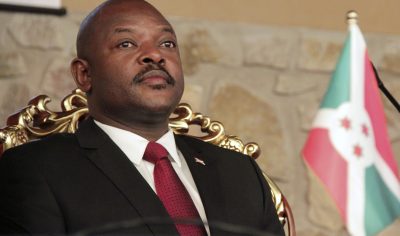By
Sylvain Muyali
The international community has in ten years allowed an apprentice dictator and religious fanatic access to power. Through agreements, reconciliations and ‘peace’ it has not only initiated but sponsored such control, but is something it can no longer defend nor impose.
President Pierre Nkurunziza so far appears to be enjoying holding on to power, that is however until God alone, and no one else, comes to stop him. All powers (political, social, financial, military, sports, media and soon religious) are concentrated in the hands of one man and his clique of generals, politicians and customers.
What a sad reality for the international community, which seems to have short memories! It has already forgotten the mechanisms and context that led the rebel and political player Nkurunziza into power: The socio-political and economic exclusion by the political powers of the time, the marginalisation, injustice, not to mention the armed rebellion of intellectuals, military, political and civilian actors; young people who were victims or felt as such.
Do not forget that the same mechanisms produce the same effects in a similar context. And for some time, it is these mechanisms – that generated Nkurunziza and his circle of affinity and customer-operating in Burundi; the same scenario as before looming on the horizon, with a number of factors acting as accelerators.
Assassinations, intimidation, arbitrary imprisonment, torture, deprivation of freedoms and frustrations that multiply more or less on a larger scale.
The large number of exiles from diverse socioeconomic and political fields, multi-talented, experienced individuals that have proven networks: intellectuals, politicians, media, civil and economic, military of all ranks (including Nkurunziza’s former comrades); young people who have nothing to lose.
Nkurunziza’s experience can serve as a model; he and his clique having come to power enjoying various privileges through armed struggles.
The Heads of State are also tempted by the constitutional and electoral coup, anxious to preserve their interests, which may formally or informally support one or the other party.
Yet the international community shines through inaction; its intervention is limited to the level of discourse suggesting restraint on the part of the various parties, dialogue and Burundians to find the solution, under the pretext of not being accused of paternalism and interference.
Nevertheless, it is paternalism and interference which are still and continue to be practised, in different forms. Many intervene in full sight of all to prevent the worst (always possible), while serving as a warning to other despots and potentates apprentices, waiting to see the outcome of forcing Pierre Nkurunziza to adapt their strategies and not yield to calls for democratic change.
Nowhere in the world, two opposing parties or conflict have themselves reached a solution to their disputes. There are only two possibilities: either one party takes over the other, crushes and imposes his way of seeing things, a third party (the population – by the ballot box, a stronger method that both parties concerned or most listened to by them – by way of mediation) intervenes to bring the two parties to find a solution to their differences.
Given the recent political and security developments in Burundi, its history and regional context, the international is playing the role of the third party community.
Burundi does not economically or politically weigh heavy on the international stage. However, the deterioration of the socio-political situation and security in Burundi could have a domino effect in neighbouring countries, with security, economic, political, ecological and humanitarian issues, whose already suspect extent in diplomatic circles and international organisations, all play a part. Smart therefore is one who can predict the outcome.
Pierre Nkurunziza and his cronies have unsheathed the first and showed their muscles facing the international community, ignoring the advice, warnings and threats thereof. It is high time that the international community finally takes action, lends itself to the game that has big muscles and delivers the fight that is his: that of preserving the right to life and human dignity, of democratic change, public freedoms of press and expression, civic and political freedoms.
Of course given that China and Russia will oppose any initiatives within UN institutions; they have already given their support to Pierre Nkurunziza, and are dictatorships (in varying degrees) whose leaders have found another way to exist mediatically locally and geo-strategically in opposing powers, Western and particularly the United States of America. In addition, China is interested only in what it can buy to strengthen its economic power.
As for France, it adapts to the current situation in Burundi, probably a political blindness related to trauma inherent in its intervention in Rwanda and its past relations with this country before, during and after the genocide. But unlike China and Russia, it is a true democracy, and despite its initial misgivings, always ends up not suiting the Americans, British and Germans.



No Comments Yet!
You can be first to comment this post!